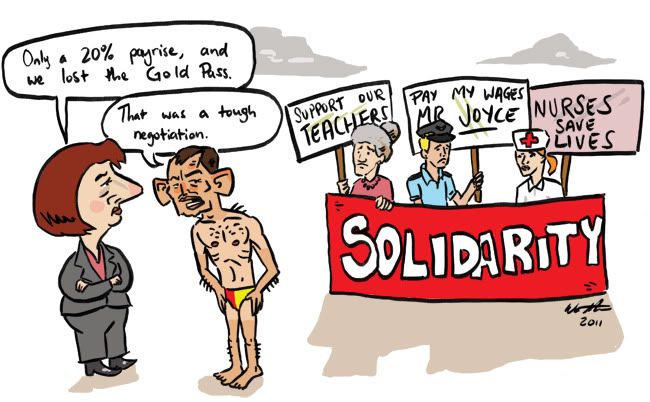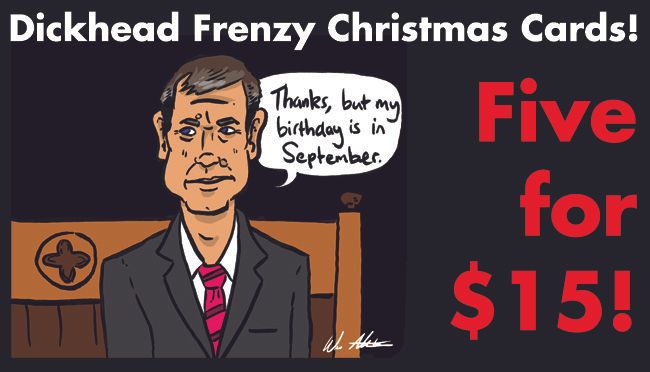Thursday, December 29, 2011
Friday, December 23, 2011
Merry Christmas Dickheads
Merry Christmas. Thanks to everyone who has read the blog posts and the cartoons over the course of the year - it's well over 50 posts now, which means I think I've been doing an average of one a week.
Thanks for the comments, the retweets and the shares - I hope you all have a wonderful Christmas, Chanukah/Hannakah, Festivus or Kwanzaa, and if I don't post again until the new year, New Years Eve too.
- Wes
A new hope
Given the current state of affairs in the asylum seeker onshore/offshore processing debate (or lack thereof, it's a mad rush to a foregone terrible conclusion), I thought I would write the speech that I would love to hear Julia Gillard give on asylum seeker policy.
Sure, it's a pie in the sky thing, but when the mood is so low and the debate so craven, sometimes even the imagining of a better situation can inspire action from a tired and jaded audience.
It seems sad that we are such a level that even the concept of hope on this issue seems laughable. But follow me down that path to where hope might still live. It's not perfect, but it's a start.
Merry Christmas.
------------
Ladies
and Gentlemen, people of Australia.
There
can be no doubt that in the past ten years, the dominant issue that
has been debated and discussed ad nauseum by media commentators
and politicians on both sides of the house is the topic of the
arrival of asylum seekers on Australian shores.
Australia
is in a unique situation - a continent populated by the citizens of a
single country - bordered only by sea. We have no shared borders and
thus we do not have the complication of policing, funding or debating
secure boundaries with a less prosperous neighbour, as our friends in
the United States or many countries in Europe do. We are bounded by
35, 877 km of coastline - natural protection from unwelcome visitors
and given this, the vast majority (so much so that we may as well say
all) of our arrivals, whether for tourism, business or migration,
have been via plane since the dawn of the age of modern, cheap, human
flight.
Despite this, the emphasis on policy has been deterring those
who would arrive by boat – we forget that the biggest deterrents of
all are the coastline, seas and remoteness that divide us from the
rest of the world; there is no path that any refugee can walk to
cross the border into Australia.
Even in this period where the
government is accused of encouraging people across the sea, boat
arrivals make up less than 5% of total asylum applications, and
countries like Italy frequently experience influxes of boat arrivals
over the course of two months that are double the the annual number
of boat arrivals in Australian waters. Overall Australia hosts just
0.21% of the world's refugees, in comparison, more than 80% are housed in
developing nations.
While
it cannot be denied that “pull” factors have an impact in our
immediate region, to some small extent – it is “push” factors
that have the greatest impact on arrivals overall, and particularly
those by boat. Push factors that drive those whose lives are in immediate risk in countries
which have been ravaged by war, some of which we as a nation have
helped to fight while not thinking of the humanitarian issue of those
who are displaced or endangered as a product of conflict.
We
think of the recent tragedy of the shipwreck off the coast of East
Java, the loss of life, and the ravaged survivors, specifically Afghani asylum seeker Esmat Adine who has told reporters of
being directed by the Australian embassy to wait for the coming years to apply for asylum,
despite immediate risk to his life in an established theatre of war.
Esmat worked for a US humanitarian organisation in Afghanistan
– he is an educated, moral and upright person with a clear
knowledge of international human rights and a contribution to make,
and yet our system failed him.
Faced with immediate danger, and the
acknowledged mortal risks associated with sea travel to a potential
better life, Esmat of course made the choice that gave him a chance
of survival. It is a choice that those of us lucky enough to have
been born into a country that has a stable democratically government,
a bounty of resources, modern infrastructure, universal healthcare
and a state-funded education system will likely never have to make,
but one that I imagine all of us would make when confronted with the
alternative.
Rather
than breaking the people smuggler's business model, the current
policy of deterrence creates and reinforces it. If there was a lawful
way for those in danger to make their way to Australia, people like
Esmat Adine have shown that they would take it. The deterrent, and
Australia's reluctance to increase its humanitarian intake as it
stands, encourages people onto boats.
And
with the capsizing and running aground of the boat that Esmat Adine
would have arrived on, it becomes clear once more that the deterrent
is not worth the cost to human life.
The
issue of boat arrivals may be one that divides our community at
present; many feel that the problem is one of “protecting our
borders” - language brought into the debate in the Howard years
that conflates those seeking asylum with a fear of alien invasion not
dissimilar to the impulse that inspired the White Australia-style
policy. My
government, and the Rudd government before it, too, has been guilty
of borrowing this language. But the time for this language is over,
and it is time that we revisited asylum seeker policy and its
emphasis in migration policy overall.
We
have an ethical, and above all else, legal responsibility to those
who seek asylum. This means not punishing them for their arrival, or
for the means in which they arrive. It also means creating viable
means of entry so that those who have grounds to seek asylum are not
encouraged onto “leaky boats” by our policy of deterrence.
We
also have an economic responsibility to the people of Australia –
this means not paying the exorbitant costs of offshore processing to
make a point that is ill-informed, unfounded and above all else, not
demonstrably beneficial to anyone concerned. The cost of processing a
single refugee in the Pacific Solution was more than half a million
dollars. During this time some refugees were detained for up to 3
years, at what has been shown to be hugely detrimental
psychologically. And of those who were detained at Nauru or on Manus
Island, the vast majority were subsequently found to be refugees –
now bearing the scars of not just the countries where they have come
from but also those of detention they did not deserve.
While
the Howard government claimed that the Pacific Solution reduced the
number of arrivals drastically, these figures fail to take into
account the fact that asylum seeker numbers worldwide were at an all
time high in 2001, and had more than halved by the end of 2006. The
numbers of refugees internationally was clearly the factor here, not the policy - at a massive cost to the Australian people, and to the people in
detention.
The Opposition Leader speaks of wanting to protect those who would board a boat to get to Australia from the threat of death in transit, failing to see that there is often graver risk in not hopping on that boat if there are no other legitimate channels to seek asylum.
As
Prime Minister, I have the job, like Labor leaders before me such as
Paul Keating and Bob Hawke, or even Liberal leaders such as John
Howard and Sir Malcolm Fraser, of putting policy into place which may
be unpopular but serves the greater needs and wishes of this country
and its people.
Having
the conviction to make these decisions, and to do what is best for
the country even if it may mean personal attack or insult, a
momentary dip in polling or the loss of government is not just the
mark of leadership - it is the duty of the Prime Minister.
Real
policy decisions look beyond the populism of those issues that will
affect voters on the way to the ballot box at the next election, and
to those issues that will affect our lives in ten years time - to
those issues that will affect our children, and even their children.
Australians
are an intelligent, rational, overwhelmingly well-educated and
aspirational people.
For too long, we have played to those among us
who would have opposed the emancipation of slaves in the United
States in the 19th
century, to those who would have opposed the tearing up of the White
Australia policy in the 20th
century, to those who fear international trade, essential to
Australia's current prosperity, on racial grounds – minority views that have been encouraged into the public's consciousness as being indicative of all Australians' position.
I believe the
Australian people are better, more moral and more intelligent, than that.
Given this, my government will not be taking up the offer
made by Tony Abbott to change the Migration Act, to again move
processing offshore whether it is to Nauru, Manus Island or even Malaysia. The
High Court ruled against this decision in the past, and were right to
do – offshore processing is wrong in law (both nationally and internationally), as well as ethics and
logic, and should remain that way.
A
regional solution is the answer, and my government remains committed
to that, but wholesale swapping of asylum seekers with other
countries in the region, where welfare cannot be assured or duty of care overseen, is not that
solution.
We
will be moving to ensure that the channels by which asylum seekers
can arrive are safer, more open and more transparent - this means increasing the proportion of refugees in our migration intake to accomodate those seeking asylum at their country of origin. And for those
who do arrive by boat or plane, processing will be conducted onshore, within the community. This process will be conducted
with transparency, and open to public scrutiny – bound by the conventions of the Australian public service, and not hidden behind security
classification.
For
those who fear for our infrastructure – though the numbers do not
merit this fear – we will provide it, and where necessary reinforce
it. The Gillard and Rudd governments, and the Labor party as a whole,
have shown that we are the party of infrastructure investment –
something sorely lacking in the Howard government that preceded us.
It
is time that Australia took a stand, not in protecting or closing our
borders, but in meeting our international obligations to create a
fair and just environment for those who arrive on our doorstep in
need, no matter the means of arrival.
Let's show the international community what it means to be Australian.
Monday, December 19, 2011
Something fishy about the link bait
Something
(okay a lot) about this The Age/SMH article ("Survivors tell why the boatskeep coming") on the asylum seeker boat sinking on Sunday didn't sit well
with me. It just fits the mainstream media narrative on the issue so well - it
largely skirts around the disaster itself, and jumps right to the
"scoop" of finding an asylum seeker who apparently doesn't want to be
an asylum seeker. Somehow, Esmat Adine's view on asylum seeker policy fits the
current narrative perfectly - he even
asks Australia to "close the borders". Paging Andrew Bolt!
But,
clearly, it's not the whole story (in fact, quite literally). It's actually a
cut down version of another article by Tom Allard ("Rescuers find 13 onisland off East Java"), the correspondent, which seems to have been custom
built for link bait on the front page.
With a quick Google search on his name, you
can see that Adine is the key course for virtually every story on the
survivors. That's understandable, I imagine it's going to be hard to find
someone in the group who wants to talk, especially given the circumstances of
their arrival (to twist a Howardism). But more to the point, as mentioned here
in the full piece, which also appears on the Age/SMH website, but is not
featured, Esmat Adine is a fluent English speaker, and from what we can gather
given the spread of his message, the only English speaker - meaning he's
probably the only person most Australian journalists or correspondents could
easily interview.
The
main thing here, though, is that the short feature article, omits to give us
Adine's full message - the survivor is actually saying that he arrived by boat
because there was no other viable channel:
''We will do again. Because we have nothing. If we are going to die, our responsibility will be with the Australian government.'' Mr Adine says he tried repeatedly though official channels in Kabul to apply to go to Australia as a refugee.
''They just sent me an email that I should apply in 2013 or 2014. I cannot … my life was in serious danger but nobody would answer me.''
Rather
than claiming the government has culpability for not "closing the
borders" and therefore putting lives at risk, Adine actually appears to be
suggesting that Australia's attitude to seeking overall is the reason lives are
at risk - ie. "the queue" doesn't work.
"Australia's policy towards asylum seekers is unfair. Those who catch a boat to Australia are resettled quickly. Those who do not make it, or apply through official channels, are denied."
The
cut-down version of the article also omits to tell us that Esmat Adine used to
work for a US aid organization in Afghanistan - and thus is in a better
position to comment on, and likely apply for, asylum.
Really,
given this is what's actually appearing on the Age and SHM frontpages as a feature
article it's a mean hatchet job. It also seems to be regurgitating the
information for two separate articles: one to dishonestly forward an agenda,
the other to actually educate and inform. Hedging your bets much, Fairfax?
Kim Jong Getty
The real tragedy is that the final proper Bugle (hopefully for this year) was just last week.
But all joking aside, I don't believe in hell or heaven, so I hope that Kim Jong-Il's last moments were incredibly painful.
But all joking aside, I don't believe in hell or heaven, so I hope that Kim Jong-Il's last moments were incredibly painful.
Monday, December 12, 2011
Hang on, this is a loaded deck!
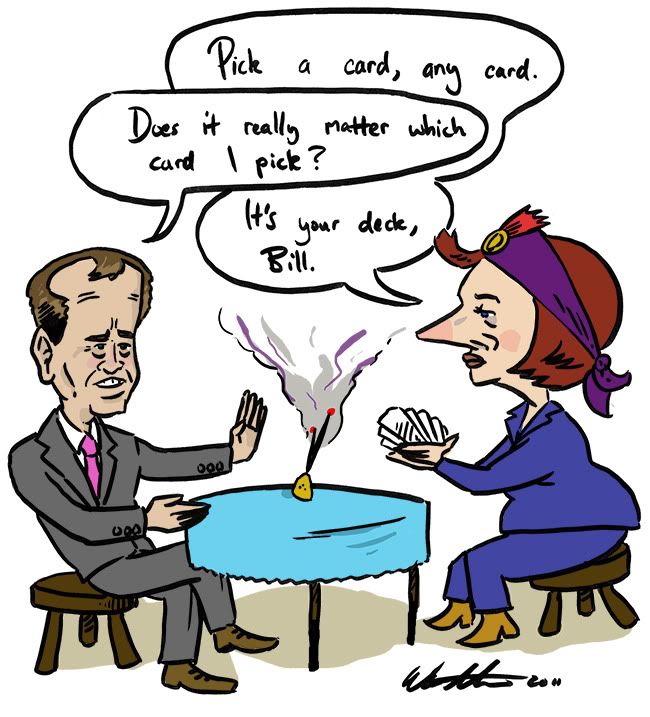
I intentionally didn't comment on the reshuffle rumours, because I've been wrong before (and I would have sid it was BS, to be honest), but I've quite enjoyed seeing everyone who was saying last week that it was nonsense covering it like they could see it all coming.
I guess this is Australia. Today.
------
Speaking of cards....

Saturday, December 10, 2011
"They made me say it!" or how we learned to stop thinking and love the double speak.
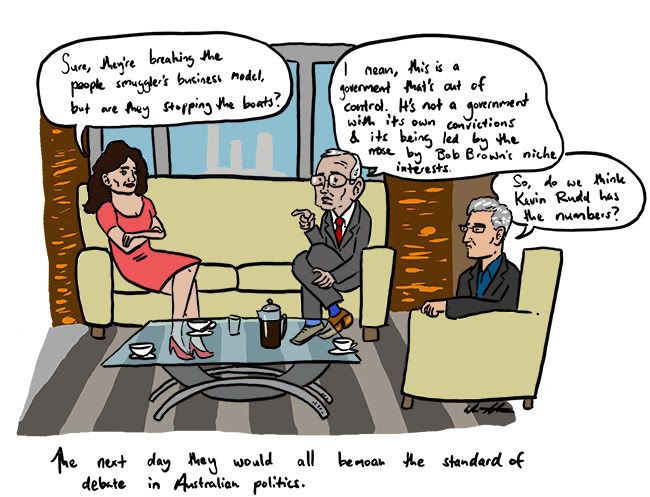
This is partly inspired by the lack of Insiders over the holiday period, and partly inspired by this argument I had with Latika Bourke on Twitter the other night (click to enlarge)...
It really frustrates me when journalists and commentators blame the tone of political discussion on politicians... Surely at least some of the blame must go to those whose job it is to educate and report. The tone and lexicon of political debate in parliament may set the agenda for what is reported, but going beyond the superficial is what journalism is all about.
If you're thinking I'm being unfair (and to a certain extent I am by just targeting Latika, for that I apologise, she's clearly not the only one, just the example I have at the moment), I'm wondering when we're going to start seeing journos on twitter giving regular updates of visa overstayers and the number of asylum seekers who arrive by plane.
If you're going to call the horse race, call the whole shebang - not just the horses that are easy to see.
------
Hey, it's almost Christmas! Why not buy some Dickhead Frenzy Christmas Cards to go on your presents?

Friday, December 2, 2011
A bet each way is the least worst policy
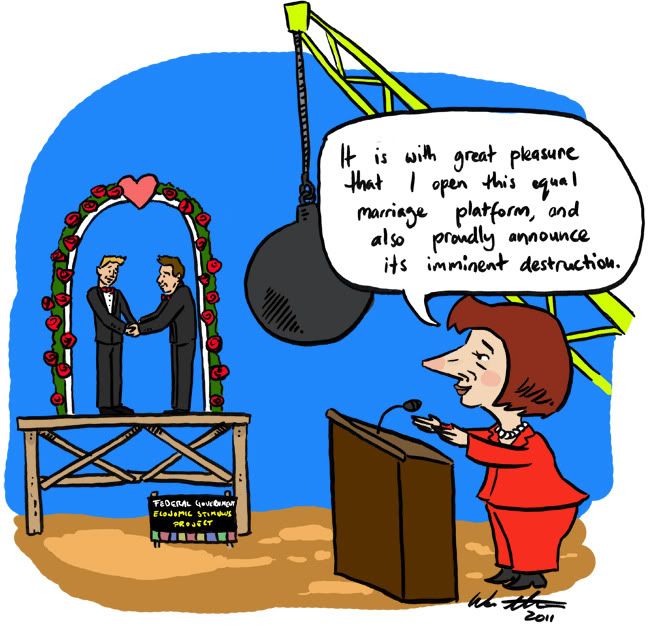
It's kind of a sad state of affairs when Mark Arbib's cowardly and hollow bet each way becomes ALP policy. Marriage equality is now the ALP platform, and it's essentially a given that it will also be destroyed by a conscience vote. We live in hope that it won't, but that hope is bruised and knows to flinch when anyone raises their hand.
The even sadder thing is that this is one of those issues where the individual beliefs of those in parliament would appear to be out of step with their electorates. A completely disproportionate amount of MPs state they believe "marriage is between a man and woman" and a similarly disproportionate number of MPs are regular church goers. I'm not saying these things are definitively analogous, but it does show that the personal views of our MPs are often out of step with their electorate - and that the views of the electorate (which polls have shown are consistently in favour of marriage equality by a considerable majority) will almost certainly not be reflected in a conscience vote.
Don't even get me started on offshore processing...
Speaking of religion and religious holidays... would you like to support the Frenzy and delight your relatives in the process?

Thursday, December 1, 2011
Subscribe to:
Posts (Atom)





